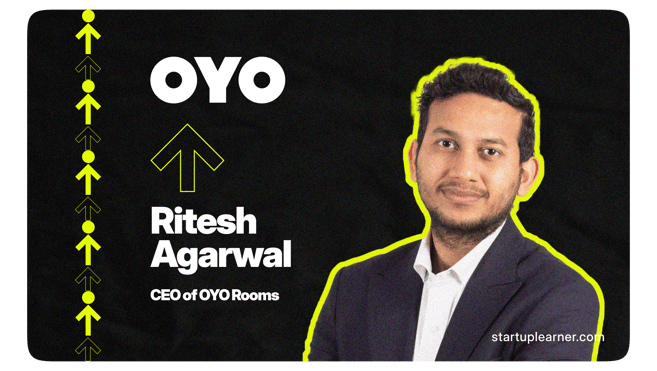Ritesh Agarwal: How a College Dropout Built a Global Hospitality Empire with OYO
FOUNDERSMOST RECENT
Startup Learner
4/12/20252 min read



Introduction
At just 19 years old, Ritesh Agarwal had already started reshaping the Indian hospitality landscape. Armed with a simple idea — making budget stays reliable and accessible — he turned OYO Rooms into one of the world’s largest hotel chains. His journey is a testament to ambition without limits.
Early Life and Background
Ritesh Agarwal was born in Bissam Cuttack, a small town in Odisha, India. Growing up in a middle-class family, he showed entrepreneurial instincts early. By the time he was 13, he was selling SIM cards to make extra money.
His thirst for learning and exploration led him to move to Kota, Rajasthan, initially to prepare for engineering entrance exams. But Ritesh wasn’t interested in a conventional path. Instead, he spent his time traveling across India, often staying in budget hotels — and noticed a recurring problem:
Inconsistency. Poor service, bad quality, unreliable experiences.
He realized that travelers, especially budget-conscious ones, lacked reliable options.
That insight planted the seeds for what would become OYO.
The Big Idea: Standardizing Budget Stays
In 2012, Ritesh launched Oravel Stays, a platform for listing and booking budget accommodations — think of it like an Indian version of Airbnb for short stays.
However, within a year, he realized listing wasn’t enough. The real problem was the quality of stays.
In 2013, he pivoted the model and launched OYO Rooms — short for On Your Own.
Instead of just listing hotels, OYO would partner with budget hotels, standardize the experience (clean linens, free Wi-Fi, breakfast, service guarantees), and brand them under OYO.
This simple but powerful pivot — from marketplace to full-stack brand — changed everything.
Building the Company: From 1 Hotel to Thousands
At 19, Ritesh became the first Indian to win the Thiel Fellowship, a $100,000 grant given to young entrepreneurs who drop out of college to pursue startups.
Armed with mentorship and funds, Ritesh focused on aggressive expansion:
Handpicked hotels that could be upgraded quickly
Standardized operations and branding
Built a tech platform for booking and backend management
Growth was explosive.
By 2018, OYO had expanded across India, China, Southeast Asia, Europe, and even the U.S.
They offered not just hotel rooms but also vacation homes and co-living spaces.
At its peak, OYO was operating in 80 countries with over a million rooms.
Lessons for Founders
Ritesh Agarwal’s story offers massive lessons for entrepreneurs:
1. Be obsessed with the real problem.
He didn’t settle with listing — he went deep into solving quality and trust issues.
2. Pivot fast when needed.
Oravel wasn’t working. He pivoted early into OYO, changing the trajectory.
3. Think big, start scrappy.
He started with one hotel in Gurgaon. Vision was global from day one.
4. Speed is a competitive advantage.
OYO's aggressive expansion made it hard for competitors to catch up early on.
5. Learn continuously.
Despite early success, Ritesh kept seeking mentorship and feedback from seasoned entrepreneurs.
The Impact
OYO helped professionalize and brand the fragmented Indian budget hotel sector.
It gave thousands of small hotel owners technology, branding, and a steady stream of customers.
More importantly, it changed middle-class travel in India — making reliable stays accessible in Tier 2 and Tier 3 cities where major hotel chains had no presence.
Globally, OYO’s model inspired a new wave of hospitality startups focused on standardization at scale.
Conclusion
Ritesh Agarwal's story proves that you don't need a fancy degree or Silicon Valley address to build a global company.
You need to deeply understand a painful problem, be fearless in execution, and scale with relentless energy.
For aspiring founders, the takeaway is simple:
Age, background, and resources are not excuses. Curiosity, speed, and focus on the real problem are what matter.



